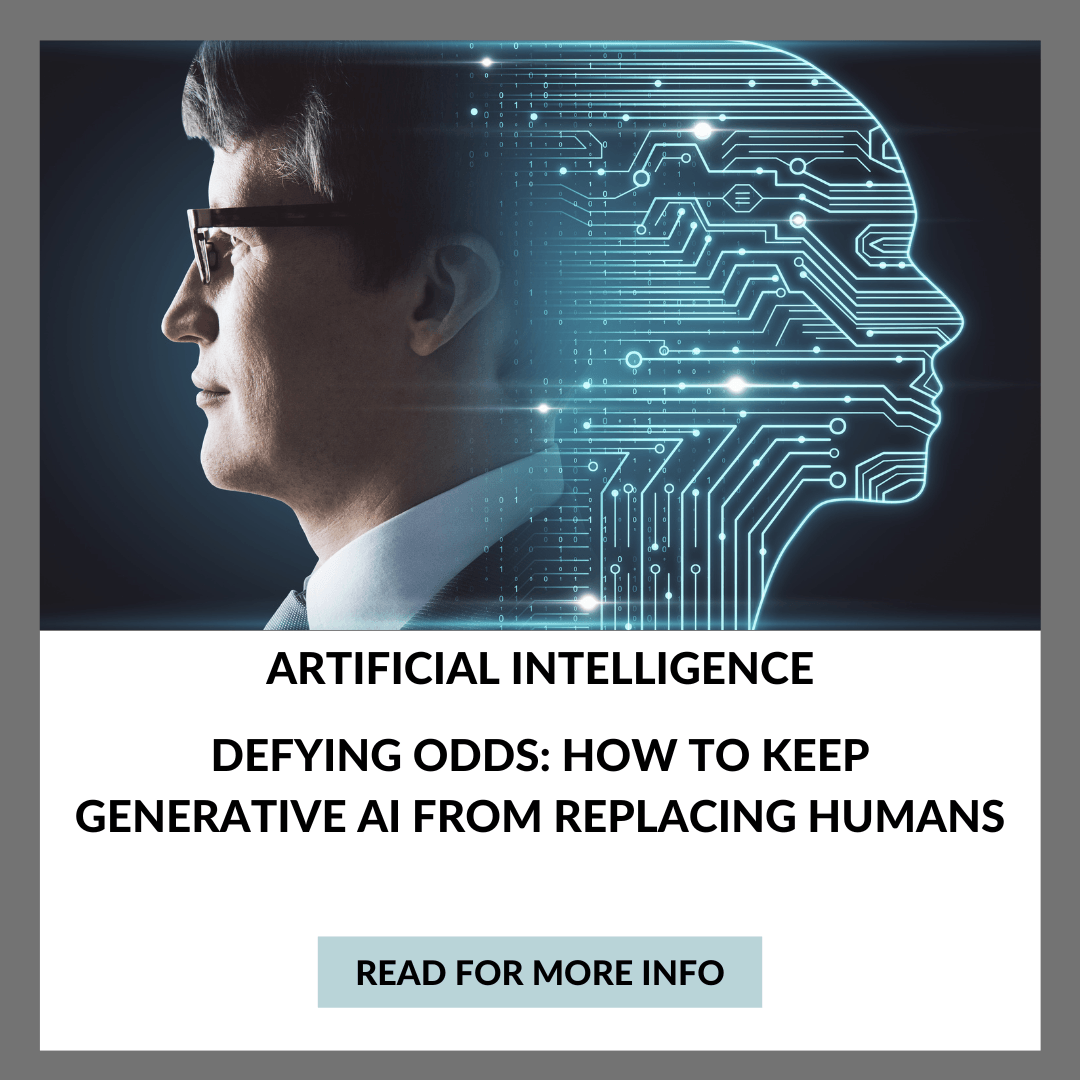Generative AI, like OpenAI’s ChatGPT, has the potential to revolutionize industries and reshape the workforce, but it is crucial for us, as humans, to understand how to navigate this rapidly changing landscape.

In the workplace, artificial intelligence has the potential to enhance productivity. However, it is also important to consider the possibility of job losses. Businesses must carefully evaluate the impacts and make informed decisions about the implementation of generative AI to minimize any negative consequences.
By embracing the future with an open mind and a focus on our unique human skills, we can navigate the era successfully. Our adaptability and ability to collaborate with AI will be crucial in maintaining a valuable role in the workforce. Let us forge ahead, combining the power of technology with our innate human capabilities to create a harmonious and thriving future.
Table of Contents
AI vs. Keeping Humans in Jobs
Factual Data: OpenAI’s ChatGPT, has the potential to replace human workers and trigger massive unemployment. To defy the odds and maintain a role in the workforce, humans should focus on skills that AI currently struggles with, such as entrepreneurialism, problem-solving, organizing, and multiple specialization.
Entrepreneurialism, in particular, requires the ability to plan, mobilize resources, and think creatively, which AI currently lacks.
Humans should also embrace a variety of specialized skills to adapt to the changing landscape of AI.
While artificial intelligence presents ethical risks, organizations need to assess and mitigate these risks. The risks include the generation of false information, the inability to distinguish fact from fiction, and the reliance on AI outputs without critical thinking. In the workplace, generative AI can enhance productivity but may also lead to job losses.
Businesses need to consider the potential impacts and make informed decisions about the implementation of generative AI.
Key Takeaways:
- Focus on skills that AI struggles with, such as entrepreneurialism and problem-solving.
- Embrace multiple specializations to stay valuable in the face of AI advancements.
- Assess and mitigate the ethical risks associated with generative AI, including the generation of false information.
- Be critical of AI outputs and avoid relying solely on them without critical thinking.
- Consider the potential impact on job losses and make informed decisions about the implementation of generative AI.
Focusing on Human Skills: The Key to Maintaining Relevance
To defy the odds and maintain a role in the evolving workforce, we must focus on developing and honing the skills that AI currently struggles to emulate. While generative AI, such as OpenAI’s ChatGPT, has the potential to replace human workers and trigger massive unemployment, there are specific skills that humans possess that AI cannot easily replicate.
By prioritizing these skills, we can stay valuable in an AI-dominated world.
Entrepreneurialism is one such skill that requires a unique set of abilities. It involves planning, mobilizing resources, and thinking creatively—areas where AI currently falls short.
By embracing entrepreneurialism, individuals can tap into their innovative potential, identifying new opportunities and adapting to the changing landscape of AI.
Problem-solving is another critical skill where human minds excel. AI may provide solutions based on available data, but it often lacks the lateral thinking required to navigate complex problems.
Organizing and multiple specialization are also important in maintaining human relevance. Humans have the ability to synthesize information from different domains and apply them to various situations. This adaptability allows us to tackle a wide range of challenges, making us indispensable in a world where AI specializes in narrow tasks.
By cultivating these skills, we can complement AI systems rather than be replaced by them. It is through the collaboration of human skills and AI technologies that we can thrive in the future of work.
While we acknowledge the ethical risks associated with generative AI, including the generation of false information and the reliance on AI outputs without critical thinking, it is crucial for organizations to proactively assess and mitigate these risks. By implementing stringent quality control measures and fostering a culture of critical thinking, we can ensure that the benefits of generative AI are harnessed responsibly and ethically.
| Skills to Prioritize: | Why Humans Excel: |
|---|---|
| Entrepreneurialism | Planning, resource mobilization, and creative thinking |
| Problem-solving | Lateral thinking, navigating complex problems |
| Organizing and multiple specialization | Synthesizing information and adaptability |
To maintain relevance in an AI-dominated world, we must focus on developing and leveraging the skills that AI currently struggles to emulate. By embracing entrepreneurialism, problem-solving, organizing, and multiple specialization, we can complement and collaborate with AI technologies, ensuring our continued value in the evolving workforce.
Furthermore, organizations must assess and mitigate the ethical risks associated with generative AI, while making informed decisions about its implementation in the workplace. By striking a balance between human skills and AI capabilities, we can thrive in the future of work.
Assessing and Mitigating Ethical Risks of Generative AI
While generative AI offers tremendous potential, it also presents ethical risks that we need to address appropriately. As we venture into an era where AI systems can generate content and information, we must be cautious about the potential consequences.
One of the key ethical risks associated with generative AI is the generation of false information.
With AI’s ability to mimic human language and create convincing narratives, there is a risk of spreading misinformation and deepening the challenges in distinguishing fact from fiction.
In order to mitigate these risks, organizations and individuals must prioritize critical thinking. Reliance solely on AI outputs without questioning their accuracy or validity can lead to detrimental consequences. It is crucial to approach AI-generated content with a discerning eye, cross-referencing information from reliable sources and fact-checking as necessary.
By maintaining a human touch and engaging in critical thinking, we can ensure that we do not fall victim to the potential pitfalls of generative AI.
Furthermore, it is essential for organizations to develop robust mechanisms for assessing and mitigating the ethical risks associated with generative AI. This can include implementing rigorous validation processes, requiring human oversight, and establishing checks and balances to prevent the dissemination of false or harmful information.
By combining the strengths of human judgment with the capabilities of AI, we can strike a balance that leverages the benefits of generative AI while minimizing the risks.
As we navigate the advancements of generative AI, it is crucial to approach its implementation with caution and foresight. By acknowledging and addressing the ethical risks, we can ensure that generative AI is harnessed responsibly and ethically.
It is our collective responsibility to use this powerful technology to enhance our lives and society while upholding the core values of truth, authenticity, and critical thinking.
| Ethical Risks | Mitigation Strategies |
|---|---|
| Generation of false information | Implement rigorous validation processes and fact-checking mechanisms |
| Distinguishing fact from fiction | Prioritize critical thinking and cross-reference information from reliable sources |
| Reliance on AI outputs without critical thinking | Require human oversight and establish checks and balances |
Embracing Generative AI in the Workplace: Productivity and Job Impact
Generative AI has the potential to significantly enhance productivity in the workplace, but it is crucial for businesses to carefully consider the potential impacts and make informed decisions. While the use of generative AI can lead to improved efficiency and streamlined processes, it is essential to strike a balance that minimizes the risk of job losses.
One way to embrace generative AI while preserving employment opportunities is to focus on augmenting human skills. By prioritizing skills that AI currently struggles with, such as entrepreneurialism, problem-solving, organizing, and multiple specialization, humans can position themselves as valuable contributors in the face of AI automation.
Entrepreneurialism, in particular, requires the ability to think creatively, plan strategically, and mobilize resources, skills that AI lacks.
Organizations must also address the ethical risks associated with generative AI. The potential generation of false information, the challenge of distinguishing fact from fiction, and the temptation to rely solely on AI outputs without critical thinking all pose significant risks.
To mitigate these risks, businesses need to assess the reliability of AI systems, implement safeguards, and ensure humans are involved in the decision-making process.
| Benefits of Generative AI in the Workplace | Considerations for Businesses |
|---|---|
|
|
By approaching the integration of generative AI in the workplace with careful consideration and a focus on human skills, businesses can harness the potential benefits while mitigating the associated risks. This requires a balance between automation and human involvement, leveraging AI as a tool to augment human capabilities rather than replace them entirely.
It is through this collaboration between humans and AI that the full potential of generative AI can be realized, leading to increased productivity, innovation, and economic growth.
Conclusion
As we navigate the AI era, it is vital that we embrace the future fearlessly, leaning on our unique human touch and adaptability to maintain a valuable role in the workforce. Generative AI, such as OpenAI’s ChatGPT, has the potential to replace human workers and trigger massive unemployment. However, by focusing on skills that AI currently struggles with, we can defy the odds and stay relevant in the face of automation.
Entrepreneurialism, problem-solving, organizing, and multiple specialization are skills that set us apart from AI. Entrepreneurialism requires the ability to plan, mobilize resources, and think creatively, which AI currently lacks. By honing these skills, we can contribute to the workforce in areas that AI cannot replicate.
While harnessing the power of generative AI, we must also be mindful of ethical risks. The generation of false information, the inability to distinguish fact from fiction, and the reliance on AI outputs without critical thinking are concerns that organizations should address. By assessing and mitigating these risks effectively, we can ensure that generative AI is used responsibly.
FAQ
How can humans prevent generative AI from replacing their jobs?
Humans can focus on developing skills that AI currently struggles with, such as entrepreneurialism, problem-solving, organizing, and multiple specialization. By being adaptable and embracing these skills, humans can maintain their relevance in the workforce.
What skills should humans prioritize to stay valuable in the age of AI?
Entrepreneurialism, problem-solving, organizing, and multiple specialization are skills that AI currently struggles with. By honing these skills, humans can differentiate themselves and remain valuable in a world increasingly influenced by AI.
What potential ethical risks are associated with generative AI?
Generative AI presents risks such as the generation of false information and challenges in distinguishing fact from fiction. There is also a concern about relying solely on AI outputs without critical thinking. Organizations should assess and mitigate these risks effectively.
How does generative AI impact the workplace?
Generative AI has the potential to enhance productivity but may also lead to job losses. It is important for businesses to make informed decisions about the implementation of generative AI, considering the potential impacts on employment.
What should humans focus on to adapt to the changing landscape of AI?
Humans should embrace a variety of specialized skills and be willing to adapt to the evolving landscape of AI. By continuously learning and developing new skills, humans can position themselves for success in the AI era.







